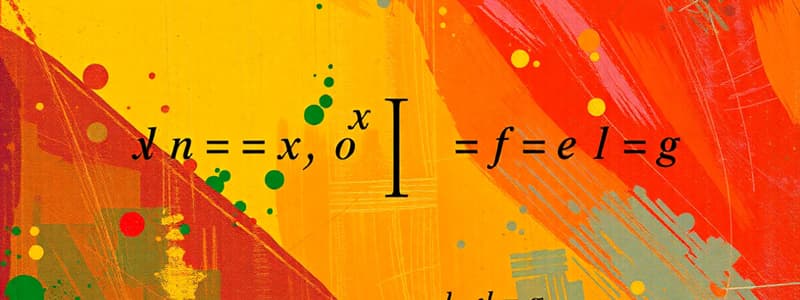Podcast
Questions and Answers
Which symbolic statement logically represents Lisa's assertion that not studying leads to not passing the test?
Which symbolic statement logically represents Lisa's assertion that not studying leads to not passing the test?
- $p ightarrow eg q$ (correct)
- $ eg q ightarrow eg p$
- $p ightarrow q$
- $p eg q$
In logical terms, how can we express the relationship between studying and passing the test according to Lisa's statement?
In logical terms, how can we express the relationship between studying and passing the test according to Lisa's statement?
- $q ightarrow p$
- $p eg q$
- $p ightarrow eg q$ (correct)
- $ eg p ightarrow q$
Which symbolic representation correctly matches Jamie's statement, 'If I go for a run, then I will not be tired'?
Which symbolic representation correctly matches Jamie's statement, 'If I go for a run, then I will not be tired'?
- ¬p → q
- p → q
- p → ¬q (correct)
- ¬p → ¬q
What does 'p' represent in Jamie's statement?
What does 'p' represent in Jamie's statement?
What does Lisa imply about studying if she states that not studying means not passing the test?
What does Lisa imply about studying if she states that not studying means not passing the test?
If '¬q' means 'I am not tired', what does 'q' represent?
If '¬q' means 'I am not tired', what does 'q' represent?
If we deny Lisa’s statement, which of the following would be logically correct?
If we deny Lisa’s statement, which of the following would be logically correct?
Which of the following incorrect interpretations reflects a misunderstanding of Lisa's implication?
Which of the following incorrect interpretations reflects a misunderstanding of Lisa's implication?
In logical notation, which of the following indicates 'I will be tired'?
In logical notation, which of the following indicates 'I will be tired'?
Which option correctly translates 'If I do not go for a run, then I am tired' into symbolic form?
Which option correctly translates 'If I do not go for a run, then I am tired' into symbolic form?
What does the symbolic form 'p → q' represent in Alex's statement?
What does the symbolic form 'p → q' represent in Alex's statement?
Which of the following logical symbols indicates a conditional statement?
Which of the following logical symbols indicates a conditional statement?
Which option represents a disjunction in logical form?
Which option represents a disjunction in logical form?
In the expression ¬p → q, what does ¬p mean?
In the expression ¬p → q, what does ¬p mean?
Which symbolic form is best represented by the phrase 'I will go to the beach unless it is raining'?
Which symbolic form is best represented by the phrase 'I will go to the beach unless it is raining'?
What does the expression p $ ext{land}$ q represent?
What does the expression p $ ext{land}$ q represent?
Which statement correctly identifies the meaning of the logical operator '$ ext{land}$'?
Which statement correctly identifies the meaning of the logical operator '$ ext{land}$'?
How can p $ ext{land}$ q be expressed in a natural language form?
How can p $ ext{land}$ q be expressed in a natural language form?
Which of the following is NOT represented by the conjunction p $ ext{land}$ q?
Which of the following is NOT represented by the conjunction p $ ext{land}$ q?
In the context of logical statements, which of the following is a true representation of p and q?
In the context of logical statements, which of the following is a true representation of p and q?
Which logical expression best represents John's plan of feeling great if he exercises and eats healthy?
Which logical expression best represents John's plan of feeling great if he exercises and eats healthy?
What does the symbol $p$ typically represent in logical expressions based on John's plan?
What does the symbol $p$ typically represent in logical expressions based on John's plan?
In the expression $(p
and q) o r$, what is the relationship between exercising, eating healthy, and feeling great?
In the expression $(p and q) o r$, what is the relationship between exercising, eating healthy, and feeling great?
Which of the following expressions indicates that the absence of exercise does not prevent feeling great?
Which of the following expressions indicates that the absence of exercise does not prevent feeling great?
What does the expression $(p o r)
or (q o r)$ imply about John's actions?
What does the expression $(p o r) or (q o r)$ imply about John's actions?
Flashcards
Jamie's statement
Jamie's statement
"If I go for a run, then I will not be tired."
p
p
"I go for a run"
q
q
"I am tired"
Symbolic form for Jamie's statement
Symbolic form for Jamie's statement
Signup and view all the flashcards
Correct answer
Correct answer
Signup and view all the flashcards
Conditional Statement
Conditional Statement
Signup and view all the flashcards
Symbolic Representation
Symbolic Representation
Signup and view all the flashcards
p implies not q
p implies not q
Signup and view all the flashcards
Logical implication
Logical implication
Signup and view all the flashcards
Negation
Negation
Signup and view all the flashcards
Logical Operator (AND)
Logical Operator (AND)
Signup and view all the flashcards
Logical Operator (OR)
Logical Operator (OR)
Signup and view all the flashcards
Logical Operator (Implication)
Logical Operator (Implication)
Signup and view all the flashcards
Logical expression for ("If I exercise and eat healthy, then I will feel great.")
Logical expression for ("If I exercise and eat healthy, then I will feel great.")
Signup and view all the flashcards
Hypothesis
Hypothesis
Signup and view all the flashcards
Conclusion
Conclusion
Signup and view all the flashcards
Alex's Statement
Alex's Statement
Signup and view all the flashcards
Conjunction
Conjunction
Signup and view all the flashcards
Symbol for Conjunction
Symbol for Conjunction
Signup and view all the flashcards
Truth Value of Conjunction
Truth Value of Conjunction
Signup and view all the flashcards
p ∧ q
p ∧ q
Signup and view all the flashcards
Meaning of 'p ∧ q'
Meaning of 'p ∧ q'
Signup and view all the flashcards




